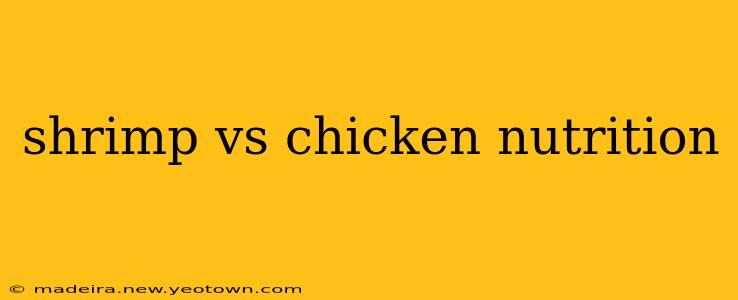The dinner dilemma: shrimp scampi or chicken stir-fry? Both shrimp and chicken are lean protein sources, popular for their versatility and delicious taste. But when it comes to nutrition, which one reigns supreme? Let's dive into a head-to-head comparison, exploring the nutritional differences and helping you make informed choices for your diet.
Our story begins in a bustling kitchen, where two chefs, one specializing in seafood and the other in poultry, are preparing their signature dishes. Chef Mariana, the seafood expert, boasts the vibrant pink of perfectly cooked shrimp, while Chef David, the poultry pro, proudly displays succulent, golden-brown chicken. Both dishes are enticing, but the real competition lies in the nutritional value they offer.
Shrimp: A Tiny Package of Nutritional Power
Shrimp, a low-calorie powerhouse, is packed with protein and essential nutrients. Three ounces of cooked shrimp contain approximately:
- Calories: Around 85-100
- Protein: About 20 grams - a significant contributor to muscle growth and repair.
- Vitamin B12: Crucial for nerve function and red blood cell formation. Shrimp is an excellent source.
- Selenium: A powerful antioxidant that protects cells from damage.
- Omega-3 Fatty Acids: Though in smaller amounts compared to fatty fish, shrimp still contributes to heart health.
Chef Mariana emphasizes the ease of preparation and the versatility of shrimp. "It absorbs flavors beautifully," she says, "and can be incorporated into countless dishes."
Chicken: A Versatile and Reliable Protein Source
Chicken breast, often hailed as the ultimate diet staple, is another lean protein champion. A three-ounce serving of cooked chicken breast provides approximately:
- Calories: Around 140
- Protein: Roughly 26-30 grams –slightly higher than shrimp.
- Niacin: Important for energy metabolism and DNA repair.
- Vitamin B6: Plays a vital role in brain development and immune function.
- Phosphorus: Essential for strong bones and teeth.
Chef David highlights chicken's affordability and abundance of readily available recipes. "Chicken is a kitchen staple," he explains. "Its mild flavor makes it adaptable to a wide range of cuisines."
Which is Better for Weight Loss?
Shrimp's lower calorie count gives it a slight edge in weight management. However, both are excellent choices for those aiming to lose or maintain weight, provided they are prepared in healthy ways (think grilling, baking, or steaming instead of frying). Portion control is key with both.
Are there any health benefits to one over the other?
Both shrimp and chicken offer significant health benefits. Shrimp's higher selenium content is beneficial for thyroid function and overall antioxidant defense. Chicken, on the other hand, often boasts a higher vitamin B6 content, crucial for immune support and nerve function. Ultimately, the "better" choice depends on individual dietary needs and preferences.
What are the differences in cholesterol and fat content?
While both are relatively lean, chicken generally has slightly less cholesterol and fat than shrimp. However, the cholesterol content in shrimp is unlikely to significantly impact most people's health unless they have pre-existing conditions. Moderation is always key.
How do they compare in terms of cooking methods and preparation?
Both shrimp and chicken are incredibly versatile. Shrimp cooks quickly, making it ideal for weeknight meals. Chicken offers more cooking flexibility, allowing for various methods like grilling, roasting, baking, and slow cooking. Both can be incorporated into salads, stir-fries, soups, and many other dishes.
Which protein is better for building muscle?
Both shrimp and chicken are excellent sources of protein, essential for muscle building. Chicken often provides slightly more protein per serving, giving it a marginal advantage in this aspect. However, combining both with resistance training will yield the best muscle-building results.
The culinary face-off concludes not with a victor, but with a tie. Both shrimp and chicken are nutritional powerhouses, offering diverse benefits and culinary versatility. The best choice for you depends on your personal dietary preferences, health goals, and the flavors you crave. Enjoy both mindfully and as part of a balanced diet!

